Unit 9 Have you ever been to museum_词句精讲精练
英语八年级第九单元笔记

英语八年级第九单元笔记以下是八年级英语第九单元的笔记内容,涵盖了本单元的重要知识点和句型:Unit 9 Have you ever been to a museum?一、重点短语1. science museum 科学博物馆2. history museum 历史博物馆3. art museum 艺术博物馆4. natural history museum 自然历史博物馆5. space museum 宇航博物馆6. on weekends 在周末7. the Palace Museum 故宫博物院8. the British Museum 大英博物馆9. the Metropolitan Museum of Art 大都会艺术博物馆10. the National Gallery of Art 国家艺术馆二、重点句型1. Have you ever been to a science museum? 你曾经去过科学博物馆吗?2. Yes, I have. / No, I haven’t. 是的,我去过。
/ 不,我没去过。
3. What / Who have you ever been with? 你曾经和谁一起去过?4. I have been to the Great Wall many times. 我已经去过长城很多次了。
5. Have you ever been to an amusement park? 你曾经去过游乐园吗?6. Yes, we have. / No, we haven’t. 是的,我们去过。
/ 不,我们没去过。
7. Have you ever been to a water park? 你曾经去过水上公园吗?8. Yes, I’ve been there twice. 是的,我去过两次了。
9. Have you ever been to a zoo/aquarium/skating rink? 你曾经去过动物园/水族馆/滑冰场吗?10. It’s (not) the first time I have been here. 这是我第一次来这里。
unit9haveyoueverbeentoamuseum知识点梳理及单元复习
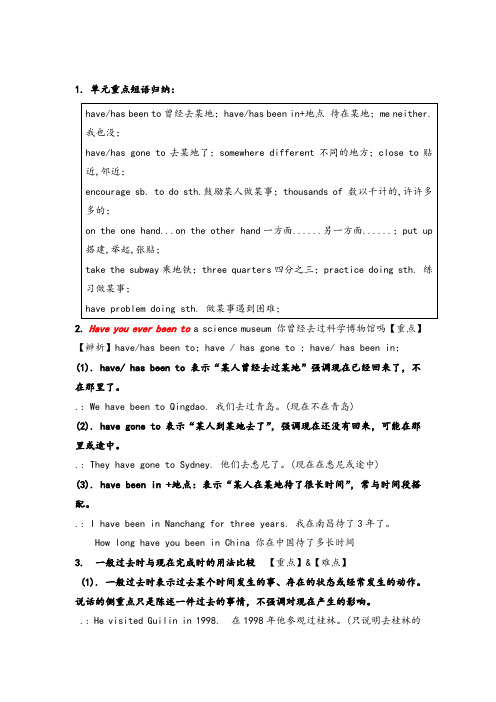
1. 单元重点短语归纳:2. Have you ever been to a science museum 你曾经去过科学博物馆吗【重点】【辨析】have/has been to;have / has gone to ;have/ has been in;(1). have/ has been to 表示“某人曾经去过某地”强调现在已经回来了,不在那里了。
.: We have been to Qingdao. 我们去过青岛。
(现在不在青岛)(2). have gone to表示“某人到某地去了”,强调现在还没有回来,可能在那里或途中。
.: They have gone to Sydney. 他们去悉尼了。
(现在在悉尼或途中)(3). have been in +地点:表示“某人在某地待了很长时间”,常与时间段搭配。
.: I have been in Nanchang for three years. 我在南昌待了3年了。
How long have you been in China 你在中国待了多长时间3. 一般过去时与现在完成时的用法比较【重点】&【难点】(1). 一般过去时表示过去某个时间发生的事、存在的状态或经常发生的动作。
说话的侧重点只是陈述一件过去的事情,不强调对现在产生的影响。
.: He visited Guilin in 1998. 在1998年他参观过桂林。
(只说明去桂林的时间)(2). 现在完成时表示动作发生在过去,对现在造成了影响或产生了结果。
不能与确定的过去时间状语连用。
.: Jill has bought a new computer. 吉尔买了一台新电脑。
I have taught here for fifteen years. 我在这儿教学已经15年了。
I have seen the film. 我看过这部电影。
(我了解这部电影的内容)I saw the film last week. 我上周看了这部电影。
Unit9Haveyoueverbeentoamuseum重点短语及用法(可编辑修改word版)

Unit 9 Have you ever been to a museum?重点短语及用法1.amusement park 游乐场2.somewhere interesting/quiet/warm 有趣/ 安静/ 温暖的地方3.make (great) progress (in)…(在……中)取得(巨大的)进步4.theme park 主题公园5.encourage sb.(not) to do sth. 鼓励某人(不要)做某事sb. be encouraged to do sth. 某人被鼓励做某事encourage sb. in sth. 在某方面鼓励某人/ 助长某人的气焰6.social life 社会生活social problem 社会问题social group 社会组织7.peaceful life 安宁的生活8.tea art 茶艺tea set 茶具9.take / ride / drive +a / the + 交通工具to ….乘坐… / 骑车/ 开车去… go to …. by+交通工具乘坐…/ 骑车/ 开车去…10.bus ride 车程ten minutes’ ride 10 分钟的路程walk ride 路程11.learn about 了解;获知;得知12.on the one hand…on the other hand 一方面…… 另一方面……13.safe food 安全的食物food safety 食品安全14.a ll year around 全年15.i n spring 在春天16.whether … or ( not) 不管…(还是),引导让步状语从句whether (…)or not 是否,引导宾语从句17.have been to…去过某地(已回来),常和次数连用have never been to…从来没去过……have gone to…去了某地(还未回来)have been in…+ for+一段时间在某地待了多长时间18.go swimming 去游泳go skating 去滑冰go hiking 去远足;去徒步旅行go shopping 去购物go bike riding 去骑自行车19.a European country 一个欧洲国家20.put up 张贴;搭建;举起Put up a tent 搭帐篷21.It’s + adj. + for +sb. +to do sth. 做某事对某人来说是…的。
Unit9Haveyoueverbeentoamuseum知识点总结
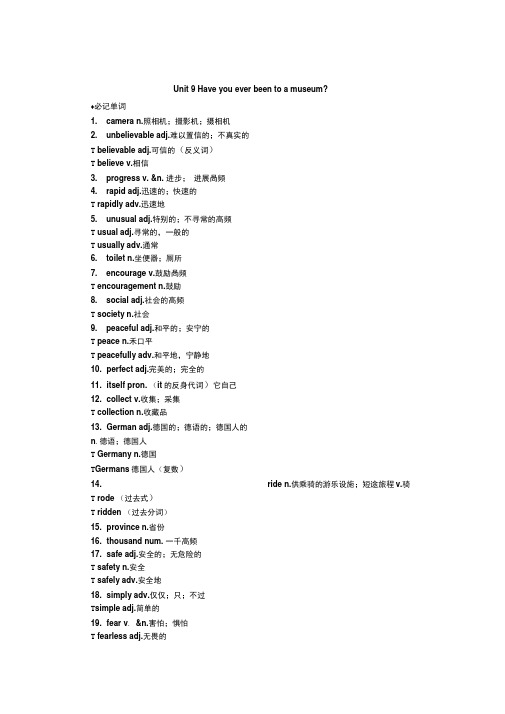
Unit 9 Have you ever been to a museum?♦必记单词1. camera n.照相机;摄影机;摄相机2. unbelievable adj.难以置信的;不真实的T believable adj.可信的(反义词)T believe v.相信3. progress v. &n. 进步;进展咼频4. rapid adj.迅速的;快速的T rapidly adv.迅速地5. unusual adj.特别的;不寻常的高频T usual adj.寻常的,一般的T usually adv.通常6. toilet n.坐便器;厕所7. encourage v.鼓励咼频T encouragement n.鼓励8. social adj.社会的高频T society n.社会9. peaceful adj.和平的;安宁的T peace n.禾口平T peacefully adv.和平地,宁静地10. perfect adj.完美的;完全的11. itself pron. (it的反身代词)它自己12. collect v.收集;采集T collection n.收藏品13. German adj.德国的;德语的;德国人的n.德语;德国人T Germany n.德国T Germans德国人(复数)14. ride n.供乘骑的游乐设施;短途旅程v.骑T rode (过去式)T ridden (过去分词)15. province n.省份16. thousand num. 一千高频17. safe adj.安全的;无危险的T safety n.安全T safely adv.安全地18. simply adv.仅仅;只;不过T simple adj.简单的19. fear v. &n.害怕;惧怕T fearless adj.无畏的20. .......................................... whether conj.不管(还是);或者(或者);是否21. Indian adj.印度的n.印度人T India n.印度22. Japanese adj.日本的;日本人的;日语的n.日本人;日语t Japan n. 日本23. fox n. 狐狸24. whenever conj.在任何.... 的时候;无论何时25. spring n. 春天26. mostly adv. 主要地;通常t most adj. 大部分的♦重点短语1. take the subway 乘地铁高频【拓展】take the bus/plane/underground/taxi/ship 乘公交车/飞机/地铁/出租车/轮船2. have a great time 玩得很高兴高频【拓展】enjoy oneself 玩得开心have fun 过得很开心3. learn about 了解【拓展】know about 了解4. lead to 导致5. put up 搭起高频6. different kinds of 不同种类的【拓展】all kinds of 各种各样的7. encourage sb. to do sth. 鼓励某人做某事高频8. think about 考虑高频9. a couple of 两个;一对;几个10. take a ride 兜风【拓展】give sb. a ride 请某人搭便车11. arrive at 到达高频【拓展】arrive in 到达get to 到达reach 到达12. thousands of 数以千计的;许许多多的高频13. on the one hand...on the other hand... 一方面..... 另一方面 ...14. wake up 醒来15. all year round 全年16. be close to 靠近17. be far from 远离【拓展】be close to 靠近(反义词)♦重点句子1. Me neither.我也没去过。
Unit-9-Have-you-ever-been-to-a-museum-单词短语句型语法练习及答
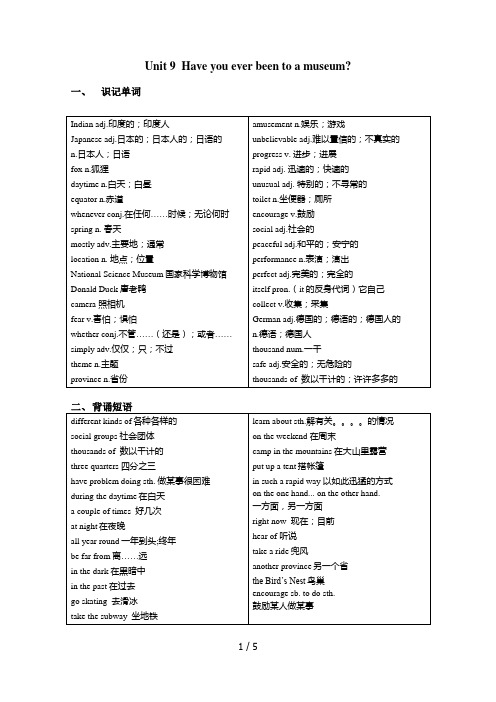
Unit 9 Have you ever been to a museum?一、识记单词三、重点句型1.Have you ever been to a science museum? 你曾经去过科学博物馆吗?2.Let’s go somewhere different today. 我们今天去个不同的地方吧。
3.It’ s unbelievable that technology has progressed in such a rapid way!科技以如此迅猛的方式发展真是令人难以置信啊!4.Whether you like Indian food,Western food or Japanese food, you’ll find it all in Singapore!不管你喜欢印度食品、西方食品还是日本食品,在新加坡你都能找到!5. One great thing is that. One great thing about Singapore is that the temperature is almost the same all year round.新加坡一个很大的特征是它的气温几乎一年到头都是一样的。
6.It is best to visit Singapore...最好去游览新加坡。
四、本课语法:现在完成时态1. 用法:①过去发生的动作对现在造成的影响或结果:强调结果例:Yesterday I finished my homework, that’s to say, I have finished my homework now.②过去已经开始一直持续到现在的动作或状态:强调继续例:I have lived here since 1990.2. 现在完成时的构成 have/has+过去分词3. 现在完成时的四个基本句型肯定句 He has finished the work. 一般疑问句Has he finished the work?否定句 He has not finished the work. 两回答 Yes ,he has. No, he hasn’t.特殊疑问句 What has he done?4. 在下列情形下用现在完成时1词语:①already 已经肯定句中或句尾例: I have already found my pen. = I have found my pen already.②yet已经:否定句和疑问句句尾例:I have not finished the work yet. Have you bought a computer yet?③ever曾经:句中例:Have you ever seen pandas?④never从不:句中例:I have never been to Beijing.⑤just刚刚:句中例:I have just done my work.⑥before以前:句尾例:I have never been there before.⑦so far到目前为止例:So far he has learnt 200 words.⑧how long多久例:How long have you lived here?⑨how many times多少次例:How many times has he been to Beijing?2两词组have<has>gone to去了某地例:He has gone to Beijing (去了北京)have<has>been to去过某地例:He has been to Beijing. (去过北京)3两结构4如果句子里面没有时间状语,汉语意思能够加“已经”,往往用现在完成时态。
部编版八年级英语下册Unit9Haveyoueverbeentoamuseum笔记重点大全

(名师选题)部编版八年级英语下册Unit9Haveyoueverbeentoamuseum笔记重点大全单选题1、—I’ve never been to the new water park. How about you, Frank?—_________. Let’s go there together!A.Neither have IB.Me, tooC.That sounds funD.So have I答案:A句意:——我从未去过那个新的水上公园。
你呢,Frank?——我也没去过。
我们一起去吧!考查情景交际。
Neither have I“我也没有”;Me, too“我也是”;That sounds fun“那听起来很有趣”;So have I“我也一样”。
根据答语中的“Let’s go there together!”可知,空处表示“我也没去过”。
“Neither+助动词/情态动词/系动词+主语.”表示前面说的否定情况也适合于后面的情况。
故选A。
2、— Could you tell me _______ you’d like me to pay you?—You’d better use mobile payment. I don’t care _______ it is Ali Pay or WeChat Pay.A.how; whetherB.how; whyC.what; whetherD.what; why答案:A句意:——你能告诉我你要我怎样付给你钱吗?——你最好使用移动支付,我不在乎是支付宝还是微信支付。
考查特殊疑问词和连词辨析。
how如何;what什么;why为什么;whether是否。
根据“use mobile paym ent”可知,上句询问的是用什么方式付钱,因此第一空用 how;根据固定搭配“whether…or...:是……还是……”可知,whether符合句意。
故选A。
八年级下册Unit9Haveyoueverbeentoamuseum要点总结

八年级下册Unit 9 Have you ever been toa museum?要点总结一、重点短语1. at night在夜晚2. in a more natural environment在一个更加自然的环境中3. all year round一年到头;终年4. be far from 离……远5. in the dark 在黑暗中6. in the past 在过去7. have been to sp. 去过某地8. science museum 科学博物馆9. history museum 历史博物馆10. amusement park 游乐园11. go somewhere different 去不同的地方12. go skating 去滑冰13. take the subway 坐地铁14. a great way to spend a Saturday afternoon一个过周六下午的好方法15. all the old movie cameras所有的古老的电影摄影机16. learn about sth.解有关。
的情况17. on the weekend 在周末18. camp in the mountains 在大山里露营19. put up a tent搭帐篷20. in such a rapid way 以如此迅猛的方式21. different kinds of各种各样的22. development of toilets 厕所的发展23. social groups 社会团体24. the tea art performances茶艺表演25. make a perfect cup of tea with beautiful tea sets用漂亮的茶具沏一杯完美的茶26. a nice place to enjoy tea 一个品茶的好地方27. thousands of 数以千计的28. International Museum of Toilets国际厕所博物馆29. the Terracotta Army 兵马俑30. Southeast Asia东南亚31. Night Safari 夜间动物园32. three quarters 四分之三33. an English-speaking country一个讲英语的国家34. have problem doing sth. 做某事很困难35. during the daytime在白天36. a couple of times 好几次37. right now 现在;目前38. an amusement park with a special theme一个有特别的主题的游乐园39. walk around the park 在公园里到处走40. hear of 听说41. take a ride兜风42. another province另一个省43. the Bird’s Nest鸟巢44. encourage sb. to do sth.鼓励某人做某事45. on the one hand... on the other hand.一方面,另一方面Section B重点短语归纳thousands of 数以千计的,许许多多的;three quarters四分之三;close to贴近,邻近;on the one hand...on the other hand一方面......另一方面......;take a holiday度假; whether...or...无论/不管?还是?;practice doing sth.练习做某事;at night在夜晚;have problem doing sth.做某事遇到困难;be asleep睡着(表示状态);of course当然; be far from远离;English-speaking country说英语的国家;二 ,重要知识点(1)重要句型1 Have you ever been to... ?Have you ever been to a science museum?你曾经去过科学博物馆吗?2. Let’s.。
Unit-9--Have-you-ever-been-to-a-museum--知识整理
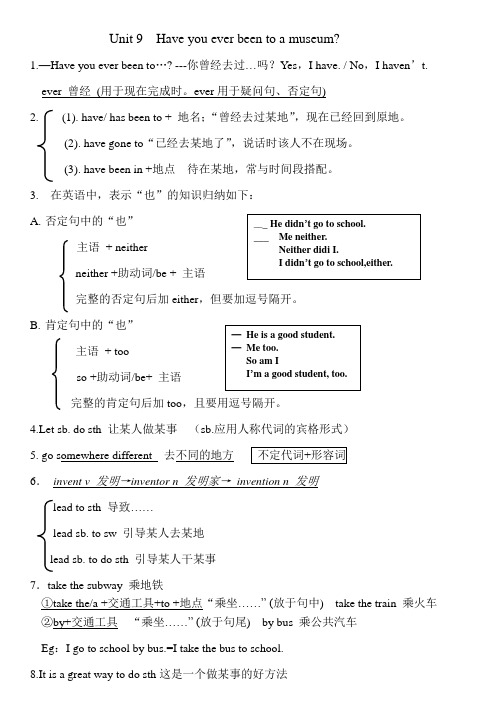
Unit 9 Have you ever been to a museum?1.—Have you ever been to …? ---你曾经去过…吗?Yes ,I have. / No ,I haven ’t. ever 曾经 (用于现在完成时。
ever 用于疑问句、否定句)2.(1). have/ has been to + 地名;“曾经去过某地”,现在已经回到原地。
(2). have gone to “已经去某地了”,说话时该人不在现场。
(3). have been in +地点 待在某地,常与时间段搭配。
3. 在英语中,表示“也”的知识归纳如下:A. 否定句中的“也”主语 + neitherneither +助动词/be + 主语 完整的否定句后加either ,但要加逗号隔开。
B. 肯定句中的“也”主语 + tooso +助动词/be+ 主语 完整的肯定句后加too ,且要用逗号隔开。
4.Let sb. do sth 让某人做某事 (sb.应用人称代词的宾格形式)5. go somewhere different 去不同的地方 6. invent v 发明→inventor n 发明家→ invention n 发明lead to sth 导致……lead sb. to sw 引导某人去某地lead sb. to do sth 引导某人干某事7.take the subway 乘地铁①take the/a +交通工具+to +地点“乘坐……” (放于句中) take the train 乘火车 ②by+交通工具 “乘坐……” (放于句尾) by bus 乘公共汽车Eg :I go to school by bus.=I take the bus to school.8.It is a great way to do sth 这是一个做某事的好方法9. go skating 去滑冰10. .on the weekend 在周末11. science museum 科学博物馆history museum 历史博物馆12.all the old movie cameras所有的古老的电影摄影机13.camp in the mountains 在大山里露营14.learn about 了解获知,得知learn about sth.了解有关……的情况15. an amusement park 一个游乐场16. the International Museum国际博物馆17. put up a tent 搭帐篷put up 搭起;举起;张贴rmation信息;资料(不可n.)some informationa piece of information 与about 连用,表示:“关于……的信息”19.It’s unbelievable that+从句“令人难以置信的……”20. make progress 取得进步make progress in 在......方面取得进步21.in such a rapid way 以如此迅猛的方式22.play chess 下棋23.be able to+V原能够做某事24.in the future在将来25.wonder 想要知道= want to know①后接从句eg:I wonder who she is.②也可接“疑问词+不定式”eg: I wonder what to do next.26.I couldn’t believe my eyes我无法相信我的眼睛。
人教版八年级英语下册Unit9 Have you ever been to a museum知识点梳理及单元复习
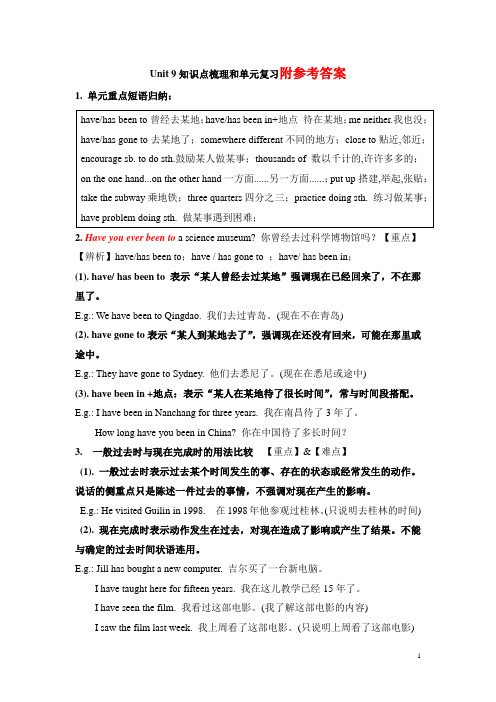
Unit 9知识点梳理和单元复习附参考答案1. 单元重点短语归纳:have/has been to曾经去某地;have/has been in+地点待在某地;me neither.我也没;have/has gone to去某地了;somewhere different不同的地方;close to贴近,邻近;encourage sb. to do sth.鼓励某人做某事;thousands of 数以千计的,许许多多的;on the one hand...on the other hand一方面......另一方面......;put up搭建,举起,张贴;take the subway乘地铁;three quarters四分之三;practice doing sth. 练习做某事;have problem doing sth. 做某事遇到困难;2. Have you ever been to a science museum? 你曾经去过科学博物馆吗?【重点】【辨析】have/has been to;have / has gone to ;have/ has been in;(1). have/ has been to 表示“某人曾经去过某地”强调现在已经回来了,不在那里了。
E.g.: We have been to Qingdao. 我们去过青岛。
(现在不在青岛)(2). have gone to表示“某人到某地去了”,强调现在还没有回来,可能在那里或途中。
E.g.: They have gone to Sydney. 他们去悉尼了。
(现在在悉尼或途中)(3). have been in +地点:表示“某人在某地待了很长时间”,常与时间段搭配。
E.g.: I have been in Nanchang for three years. 我在南昌待了3年了。
How long have you been in China? 你在中国待了多长时间?3. 一般过去时与现在完成时的用法比较【重点】&【难点】(1). 一般过去时表示过去某个时间发生的事、存在的状态或经常发生的动作。
Unit 9 Have you ever been to a museum知识点总结
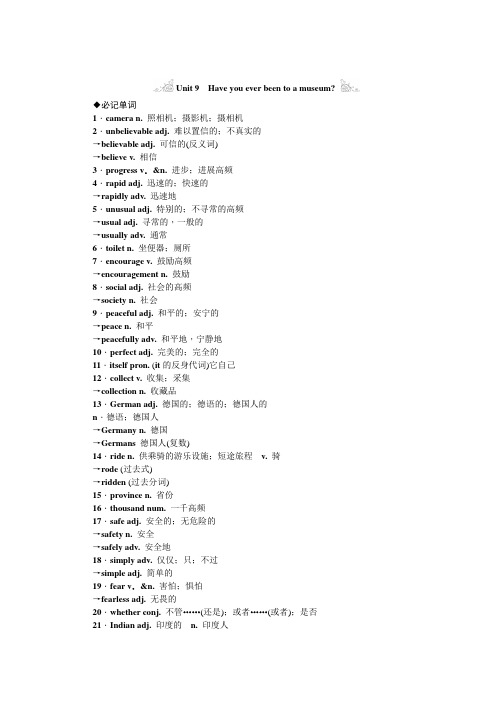
Unit 9Have you ever been to a museum?◆必记单词1.camera n. 照相机;摄影机;摄相机2.unbelievable adj. 难以置信的;不真实的→believable adj. 可信的(反义词)→believe v. 相信3.progress v.&n. 进步;进展高频4.rapid adj. 迅速的;快速的→rapidly adv. 迅速地5.unusual adj. 特别的;不寻常的高频→usual adj. 寻常的,一般的→usually adv. 通常6.toilet n. 坐便器;厕所7.encourage v. 鼓励高频→encouragement n. 鼓励8.social adj. 社会的高频→society n. 社会9.peaceful adj. 和平的;安宁的→peace n. 和平→peacefully adv. 和平地,宁静地10.perfect adj. 完美的;完全的11.itself pron. (it的反身代词)它自己12.collect v. 收集;采集→collection n. 收藏品13.German adj. 德国的;德语的;德国人的n.德语;德国人→Germany n. 德国→Germans 德国人(复数)14.ride n. 供乘骑的游乐设施;短途旅程v. 骑→rode (过去式)→ridden (过去分词)15.province n. 省份16.thousand num. 一千高频17.safe adj. 安全的;无危险的→safety n. 安全→safely adv. 安全地18.simply adv. 仅仅;只;不过→simple adj. 简单的19.fear v.&n. 害怕;惧怕→fearless adj. 无畏的20.whether conj. 不管……(还是);或者……(或者);是否21.Indian adj. 印度的n. 印度人→India n. 印度22.Japanese adj. 日本的;日本人的;日语的n.日本人;日语→Japan n. 日本23.fox n. 狐狸24.whenever conj.在任何……的时候;无论何时25.spring n. 春天26.mostly adv. 主要地;通常→most adj. 大部分的◆重点短语1.take the subway 乘地铁高频【拓展】take the bus/plane/underground/taxi/ship 乘公交车/飞机/地铁/出租车/轮船2.have a great time 玩得很高兴高频【拓展】enjoy oneself 玩得开心have fun 过得很开心3.learn about 了解【拓展】know about 了解4.lead to 导致5.put up 搭起高频6.different kinds of 不同种类的【拓展】all kinds of 各种各样的7.encourage sb. to do sth. 鼓励某人做某事高频8.think about 考虑高频9.a couple of 两个;一对;几个10.take a ride 兜风【拓展】give sb. a ride 请某人搭便车11.arrive at 到达高频【拓展】arrive in 到达get to 到达reach 到达12.thousands of 数以千计的;许许多多的高频13.on the one hand...on the other hand... 一方面……另一方面……14.wake up 醒来15.all year round 全年16.be close to 靠近17.be far from 远离【拓展】be close to 靠近(反义词)◆重点句子1.Me neither.我也没去过。
Unit9-Have-you-ever-been-to-a-museum知识点梳理及单元复习
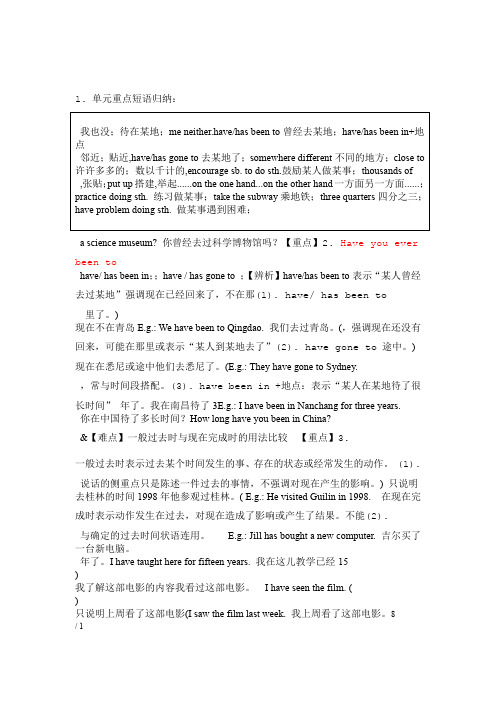
1. 单元重点短语归纳:a science museum? 你曾经去过科学博物馆吗?【重点】2. Have you everbeen tohave/ has been in;;have / has gone to ;【辨析】have/has been to表示“某人曾经去过某地”强调现在已经回来了,不在那(1). have/ has been to里了。
)现在不在青岛E.g.: We have been to Qingdao. 我们去过青岛。
(,强调现在还没有回来,可能在那里或表示“某人到某地去了”(2). have gone to 途中。
)现在在悉尼或途中他们去悉尼了。
(E.g.: They have gone to Sydney.,常与时间段搭配。
(3). have been in +地点:表示“某人在某地待了很长时间”年了。
我在南昌待了3E.g.: I have been in Nanchang for three years.你在中国待了多长时间?How long have you been in China?&【难点】一般过去时与现在完成时的用法比较【重点】3.一般过去时表示过去某个时间发生的事、存在的状态或经常发生的动作。
(1). 说话的侧重点只是陈述一件过去的事情,不强调对现在产生的影响。
) 只说明去桂林的时间1998年他参观过桂林。
( E.g.: He visited Guilin in 1998. 在现在完成时表示动作发生在过去,对现在造成了影响或产生了结果。
不能(2).与确定的过去时间状语连用。
E.g.: Jill has bought a new computer. 吉尔买了一台新电脑。
年了。
I have taught here for fifteen years. 我在这儿教学已经15)我了解这部电影的内容我看过这部电影。
I have seen the film. ()只说明上周看了这部电影(I saw the film last week. 我上周看了这部电影。
英语八年级下册 Unit9 Have you ever been to a museum单元短语过关

人教版英语八年级下册第九单元短语过关Unit 9 Have you ever been to a museum?1. a science museum 一个科学博物馆2. a space museum 一个太空博物馆3. a history museum 一个历史博物馆4.an art museum 一个艺术博物馆5.water park 水上乐园6.amusement park 游乐场7.somewhere different 某个不同的地方;不定副词,后接形容词;例如:For my next vacation , I ‘d like to go somewhere different. 下次度假,我想去个不同的地方。
st year 去年9.at night在夜晚;at noon在中午10.have \ has been to ... 去过...;例如:I have been to a wonderful placewith big gardens. 我去过一个带有很多花园的美景之地。
have \ has gone to ... 去了;例如:She can’t find Mr. Green , he has gone to Beijing. 她不能找到格林先生,他去了北京。
11.go skating 去滑冰12.take the subway 乘坐地铁13.camp in the mountains 在山上野营;例如:During the summervacation , we camped in the mountains and it was fun. 暑假期间,我们在山上野营,非常有趣。
14.put up the tent 搭建帐篷;put up 还可以表示张贴;例如:They putup their tent and slept under the tree.他们搭建好帐篷,在树下睡了。
Have you ever been to a museum_知识点汇总-人教版英语八年级下册

Unit 9 Have you ever been to a museum?一、短语归纳1.science museum科学博物馆2.history museum历史博物馆3.space museum 太空博物馆4.art museum美术馆5.water park水上公园6.amusement park游乐场7.somewhere different某个不同的地方8.have a great time玩得高兴9.take the subway乘地铁10. learn about了解11.put up搭建;支起12. color movies彩色电影13. a great way to do sth一个做某事的好方式/好方法14.in such a rapid way用如此快速的方式15.It’s unbelievable that:很难相信16.be able to do sth能够做某事17.think about 考虑18.many different kinds of许多不同种类的19. in the future在将来未来20. a couple of 少数;几个21.a perfect cup of tea一杯完美的茶22. something important重要的东西23.thousands of数以千计的24. watch sb. do sth观看某人做了某事25.want to do sth想要做某事26.encourage sb. to do sth鼓励某人做某事27.love doing sth喜欢做某事28.see sb doing sth看见某人正在做某事29.the best time to do sth做某事的最佳时间30.have problems (in) doing sth做某事有困难31. choose to do sth选择做某事32. tell sb. to do sth告诉某人做某事33.take a holiday度假34. at night 在晚上35. more than 超过;多于36.three quarters 四分之三37. on the one hand…on the other hand 一方面…另一方面38. an English-speaking country一个说英语的国家39. during the daytime 在白天40. wake up 醒来41. all year around一年到头42.close to靠近43. far from离…远44. the Great Wall长城45.the best time to do sth做某事的最好方式考点归纳考点1 辨析:have/ has been to have gone to have been in⑴have/ has been to + 地名“曾经去过某地” , 现在已经回到原地。
【全】Unit_9_Have_you_ever_been_to_a_museum

3. neither 表示“两者都不, 两者中没有一个”, 是both的完全否定形式。either 表示“两者之一, 这种用法与肯定句中的too相对应。如: Neither of the twins likes swimming. 那对双胞胎都不喜欢游泳。 Neither my sister or I am have ever been abroad. 我和我姐姐都没出过国。 My sister has never been abroad. I haven‘t, either.
两者中任一个”, 还可以用于否定句中表示“也”,
我姐姐没出过国, 我也没有。
neither还可以用于完全倒装句中, 表示“也没 有……‖。这种用法和so在完全倒装句中 表示“也……‖的用法相对应。如: My sister has never been abroad. Neither have I.
Have been to / in 和 have gone to的区别
• 1 have / has been to +地名 去过某地(去过已回来); • 2 have / has gone to +地名 去了某地(还没回来); • 3 have / has been in +地名 在某地住了有多长。
spend (spend) the day at the zoo. 3. A: Let‘s ________ been (be) there a B: Well, I‘ve already _______ couple of times, but I‘m happy_______ to go (go) again. going 4. A: How about _________ (go) to the art museum? There are some special German paintings there right now. to go (go) ? B: Sure. When do you want _______ 5. A: Have you ever _________ (visit) the visited history museum? been B: No, I‘ve never________ (be) there.
八年级英语下册Unit9Haveyoueverbeentoamuseum知识点汇总(带答案)

八年级英语下册Unit9Haveyoueverbeentoamuseum知识点汇总单选题1、— Have you ever ________ an amusement park?— Yes, I have. I ________ Fun Times Amusement Park three years ago.A.gone to; went toB.been to; went toC.been to; gone toD.been in; went to答案:B句意:——你曾经去过一个游乐场吗?——是的,我去过。
我三年前去过趣味时光游乐场。
考查have gone to和have been to的区别以及一般过去时。
have gone to+地点“去某地还未归”;have been to“去某地已回来”,根据“three years ago.”可知已回来,所以第一空应填been to;根据“three years ago.”可知此句应为一般过去时,所以谓语应填过去式,而go为不及物动词,后续宾语要用介词to,故选B。
2、They didn’t know ________ they should tell the police or not.A.ifB.whereC.whoD.whether答案:D句意:他们不知道他们是否应该告诉警察。
考查宾语从句连接词。
if是否;where什么时候;who谁;whether是否。
根据“or not”可知此处是whether...or not结构,故选D。
3、 of the students in our class going to the summer camp in Beijing next week.A.Two fifths; isB.Second fifths; areC.Second fifths; isD.Two fifths; are答案:D句意:我们班五分之二的学生打算下周去北京参加夏令营。
Unit_9_Have_you_ever_been_to_a_museum-_SectionA1

water park _____ 2
3 zoo _____
1 amusement park _____
1b. Listen. Have these students ever been to these places? Check (✓) the boxes.
Anna: So, what did you do on the weekend?
Jill:
I camped in the mountains with some
friends. We put up a tent and cooked outside.
Anna: That sounds fun. I’ve never been camping. Jill: You should try it!
2a. Look at the map of the town. Listen and circle the places you hear.
2b. Listen again and circle T for true or F for false. Conversation 1
1. Tina went to the space museum last year. T/F 2. John has never been to the space museum. T/F 3. They are going to take the subway. T/F
比较 have/has been to
He has been to Shanghai. 他(曾经) 去过上海。
比较 have/has been to have/has gone to He has gone to Shanghai. 他(已经)去上海了。
八年级.英语 unit 9 have you ever been to a museum词汇句法

第六页,共九页。
3. Watching the tea preparation is just as enjoyable as drinking the tea itself。
看沏茶的过程和饮茶本身一样(yīyàng)令人愉快。
*suffix(-able); v.-ing as S
12/9/2021
3. thousands of 数以千计的;许许多多的
4. on the one hand...on the other hand...
一方面……另一方面……
5. all year round 全年
12/9/2021
第五页,共九页。
Part 3 Sentences
1. I've never been camping. 我从未野营过。
No 以千计的。4. on the one hand...on the other hand...。5. all year round 全年
Image
12/9/2021
第九页,共九页。
第七页,共九页。
12/9/2021
第八页,共九页。
内容(nèiróng)总结
Unit 9。Words, Phrases & Sentences。Part 1 Words。11. German adj.德国的。15. whenever在任何(rènhé)。1. amusement park 游乐场。2. a couple of 两个。3. thousands of 数
*现在完成(wán chéng)进行时 2. I wonder how much more computers will be able to do in the future.
八年级英语下册Unit9Haveyoueverbeentoamuseum短语语法知识点汇总新版人教新目标版20180827464
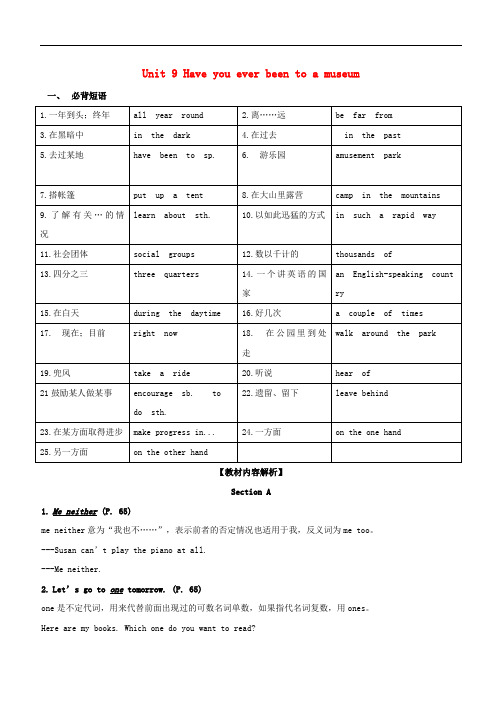
Unit 9 Have you ever been to a museum 一、必背短语【教材内容解析】Section A1.Me neither (P. 65)me neither意为“我也不……”,表示前者的否定情况也适用于我,反义词为me too。
---Susan can’t play the piano at all.---Me neither.2.Let’s go to one tomorrow. (P. 65)one是不定代词,用来代替前面出现过的可数名词单数,如果指代名词复数,用ones。
Here are my books. Which one do you want to read?---I don’t like these dresses.---How about those ones over there.3.Let’s go somewhere different today. (P. 65)somewhere用作副词,表示“在某处、到某处”,常用于肯定句中,在否定句和疑问句中用anywhere。
It’s cold here. Let’s go somewhere else.Did you go anywhere last Sunday?4.They are going to take the subway. (P. 66)take the subway意为“乘地铁”,take用作动词,可以表示“乘、坐(车、船等)”。
We take the subway to work every day.5.It’s a great way to spend a Saturday afternoon. (P. 66)(1) way表示“方法”时,后常接动词不定式或者of doing作定语。
Can you think out a way to open the door/of opening the door?(2) spend的用法① sb. spend+时间/金钱+on sth. “在某事上花费多长时间或者多少钱”The man spent the whole day on his speech.The family spent 10,000 dollars on their trip.② sb. spend+时间+(in) doing sth. “花费多长时间做某事”The boy has spent two hours playing the computer games.【拓展】辨析spend, pay, take和cost6.We put up a tent and cooked outside. (P. 66)put up意为“搭建”,还可以表示“举起、张贴”。
- 1、下载文档前请自行甄别文档内容的完整性,平台不提供额外的编辑、内容补充、找答案等附加服务。
- 2、"仅部分预览"的文档,不可在线预览部分如存在完整性等问题,可反馈申请退款(可完整预览的文档不适用该条件!)。
- 3、如文档侵犯您的权益,请联系客服反馈,我们会尽快为您处理(人工客服工作时间:9:00-18:30)。
Unit 9 Have you ever been to museum?词句精讲精练词汇精讲1. invent(1)invent 作动词,意为“发明;创造”。
例如:Edison invented the light bulb. 爱迪生发明了电灯。
(2)invent还可以表示“虚构”。
例如:The whole story was invented. 整个故事是虚构的。
(3)invent的名词形式有两个,一个是inventor(发明者;发明家),另一个是invention(发明物)。
例如:Edison is a great inventor in history.爱迪生是历史上伟大的发明家。
Human history is also a history of great inventions.人类的历史也是一个伟大发明的历史。
【拓展】invent和discover的辨析:(1)invent 意为“发明,发明之物”指“从无到有”。
例如:Alexander Graham Bell invented the telephone in 1876.亚历山大•格雷厄姆•贝尔在1876年发明了电话。
(2)discover 意为“发现”,指“本来就已经存在,但不为人知”的事物。
例如:Columbus discovered America in 1492. 哥伦布在1492年发现了美洲。
2. unbelievableunbelievable作形容词,意为“难以置信的;不真实的”,是由believable“可相信的;可信任的”加否定前缀un-派生而来的。
其动词形式为believe,意为“相信;以为”。
例如:It’s unbelievable that you are a writer. 我难相信你是一个作家。
【拓展】un-是个前缀,意为“不”。
例如:happy“高兴的”—unhappy“不高兴的”;lucky“幸运的”—unlucky“不幸的”;important“重要的”—unimportant;“不重要的”;healthy“健康的”—unhealthy“不健康的”。
3. encourageencourage 作动词,意为“鼓励”。
encourage sb. to do sth.意为“鼓励某人做某事”。
例如:The teacher often encourages us to study hard.老师经常鼓励我们要努力学习。
My mother encouraged me to enter the contest.妈妈鼓励我参加那场比赛。
【拓展】(1)encourage sb. in sth. 意为“在……方面鼓励/助长某人”。
例如:Don’t encourage him in laziness.别助长他的懒惰行为。
(2)encouragement是encourage的名词形式,意为“鼓舞/鼓励”。
例如:The teacher’s words were a great encouragement to him.老师的话对他是极大的鼓舞。
4. collectcollect作及物动词,意为“收集,搜集”。
例如:collect stamps 收集邮票collect coins 收集硬币【拓展】collection作名词,意为“收藏品、收集物”。
是动词collect 的名词形式,是由动词collect 后缀-tion变化来的。
collector 作名词,意为“收藏家”。
例如:These are my collections.这些是我的收藏品。
My brother has a very good collection of stamps.我的弟弟收集了许多邮票。
Mark is a famous stamp collector.Mark是一位著名的邮票收藏家。
5. a couple ofa couple of意为“少数;几个”。
例如:He bought a couple of books for his daughter.他为他的女儿买了几本书。
【拓展】a couple of还可意为“一双;一对”。
例如:I found a couple of socks in the room but they did not make a pair.我在房间里找到两只袜子,但他们不是一双。
6. thousands ofthousand是数词,意为“千”,当表示具体的“几千”时,用“基数词+ thousand”,注意不加-s。
例如:There are six thousand students in the city. 这个城市有6000名学生。
【拓展】(1)thousands of 表示“数千,成千上万的”这时thousand后要加-s,且后面有介词of,但是不能与数词连用。
例如:There are thousands of people on the square. 在广场上有成千上万的人。
(2)表示数词的还有hundred“百”,million“百万”,billion“十亿”。
它们的用法和thousand 一样,可以用来表示约数和确数。
7. whetherwhether常引导宾语从句,表示“是否”之意。
当把一般疑问句的直接引语转化成间接引语时,常用if或whether作引导词。
例如:I asked her, “Do you study English here?”我问她:“你在这里学习英语吗?”→I asked her if/ whether she studied English there. 我问她是否在那里学习英语。
【拓展】if和whether的辨析:if和whether均可表示“是否”,一般情况下二者可以互换。
但在下列条件下,只能用whether 而不能用if:(1)if后不能直接接or not。
(2)whether可作介词的宾语。
(3)whether后可接不定式。
(4)whether可用于句首。
(5)whether可引导主语从句、表语从句。
例如:Everything depends on whether we have enough money.一切都取决于我们是否有足够的钱。
Whether it is right or wrong, I don’t know. 正确与否,我不知道。
It doesn’t matter whether he will come or not. 他来不来没关系。
8. mostlymostly作副词,意为“主要地;通常”。
例如:He reads the occasional book, but mostly just magazines.他偶尔也看书,但大多只看杂志。
Lizards live mostly in warm climates.蜥蜴主要生长在气候温暖的地方。
He works mostly in London office.他通常在伦敦办事处工作。
词汇精练I. 英汉短语互译。
1.take the subway ________________2.by bike________________3.have a great time ________________4.take a holiday ______________5.go skating ________________6.各种各样的________________7.在将来________________8.鼓励某人做某事________________9.一方面……另一方面……______________10.数以千计的______________II. 根据汉语或首字母提示完成单词。
1.—Do you know who d______ America?—Columbus(哥伦布).2.Autumn is the third s_______ of the year.3.The t______ is very high today.You shouldn’t wear so many clothes.4.David is a ______(勇敢的) boy.5.How many ______(狐狸) can you see in the picture?6.His son is ______(醒着的) at seven every morning.7.The p______ of our city is larger than before.8.Now more and more people like to learn ______(自然的) science in China.III. 用括号内所给词的适当形式填空。
1.The book ______(it) is so perfect that everybody likes it.2.We are satisfied with their _______(perform).3.Lily’s father has large _______(collect) of old coins.4.I met some _______(German) on my way home.They asked me the way to the museum.5.I think the car is one of the best ______(invent) in our life.6.She has an ______(usual) experience in the countryside.7.The old man wanted to move to a _______(peace) place.8.The news spread ______(rapid) from mouth to mouth.9.Her _______(society) life got in the way of her study.10.Nobody believes the story.I think so.I think i t’s _______(believe).【参考答案】I. 英汉短语互译。
1.乘地铁2.骑自行车3.玩得开心4.度假5.去滑冰6.different kinds of/a variety of 7.in the future 8.encourage sb. to do sth.9.on (the) one hand...on the other hand... 10.thousands ofII. 根据汉语或首字母提示完成单词。
